Gdoo-maawnjidimi Mompii Indigenous Student Services celebrates 30 years at TMU
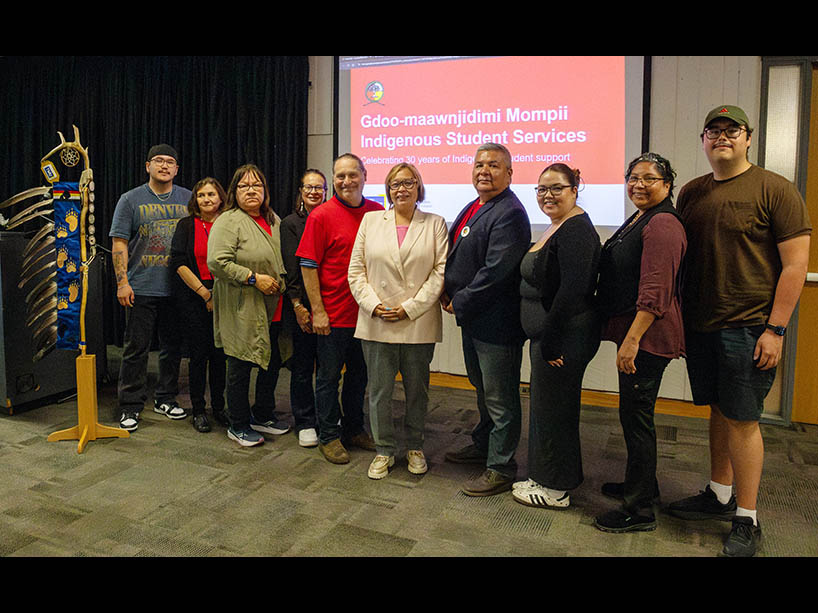
The Gdoo-maawnjidimi Mompii Indigenous Student Services (GMISS) team assembled for a group photograph to celebrate their work. From left: Sam Dyer, Diane Simone, Sheila Saikkonen, Sloan Miller, Bradley Gibson, Monica McKay, Brian Norton, Christa McKay-Kosolofski, Amy Desjarlais and Taye Alvis. Photos by Carrie Davis.
On September 25, 2024, Gdoo-maawnjidimi Mompii / We Gather Here Indigenous Student Services (GMISS) celebrated 30 years of empowering Indigenous students at Toronto Metropolitan University (TMU). The team brought together students, faculty, alumni and staff to honour GMISS's collective achievements and impact in fostering academic, personal and cultural success.
The celebration included commemorations, songs, drumming, dancing and a keynote speech by Waubgeshig Rice (external link) , Anishinaabe writer, journalist and TMU alumni.
Speakers praised Monica McKay, director of Indigenous Initiatives, Office of the Vice-President, Equity and Community Inclusion (OVPECI), for founding and fostering GMISS’s growth. In the spirit of ongoing Truth and Reconciliation at the university, speakers applauded GMISS' role in amplifying Indigenous voices while acknowledging that, like reconciliation efforts more broadly, there is still much work to be done.
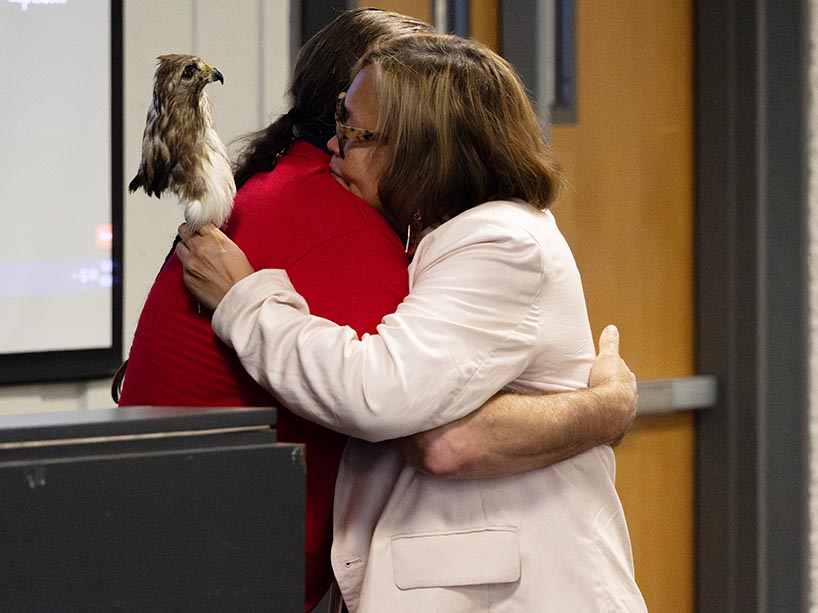
After welcome remarks and a Land Acknowledgement from event host Brian Norton, program manager, GMISS, Bradley Gibson, Indigenous academic student advisor, GMISS, presented McKay with the gift of a hawk. Like McKay, Gibson explained, the hawk is known for its insight, vision and capacity to “soar to great heights.”
“I want to let people know that I am here.”
In 1993, McKay, then a student at TMU's School of Social Work, established Gdoo-maawnjidimi Mompii, the Indigenous Student Services and Indigenous Student Centre.
McKay, who is from the Nisga'a Nation of the House of Hiwa'a and a member of the Gisk’aast (Killer Whale) clan, recalled feeling alone in her first months at the university. She also keenly felt the need for services and mentorship to support her as an Indigenous student.
During a conversation with Marion Creery, then director of Student Services, McKay raised the idea of bringing Indigenous students together. In a statement encapsulating so many Indigenous experiences — historically and today — McKay told Creery: "I want to let people know that I am here."
With Creery's assistance (and with some posters, coffee and muffins), by the end of that semester, McKay had found a handful of other Indigenous students looking for community. The following year, she established the Aboriginal Peer Support Program where, she said, "I took my role as auntie very seriously." Creating community based on kinship models, McKay worked to create a space for Indigenous students to gather, uplift and support one another.
And so, the work at GMISS began.
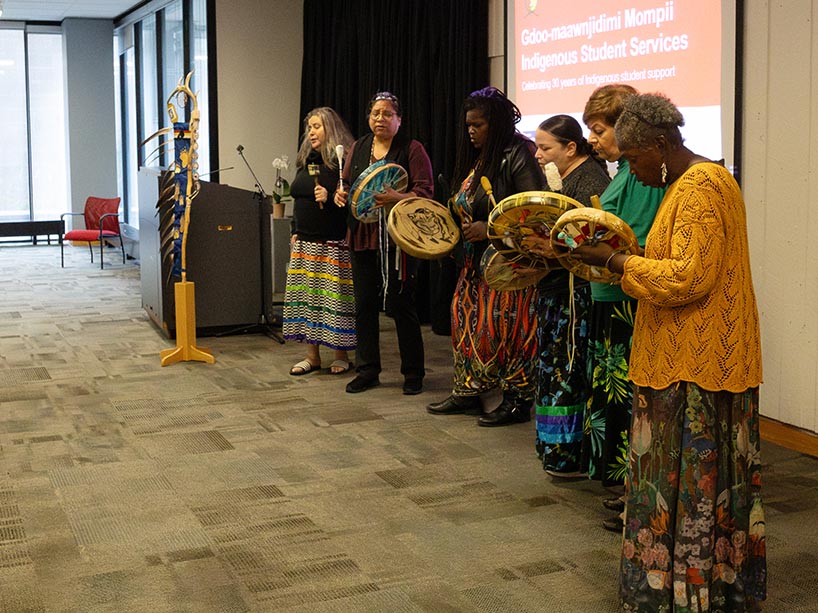
The Spirit Winds drum group performed several songs to honour Gdoo-maawnjidimi Mompii and McKay. During her speech, Amy Desjarlais, lead, Rebirthed Teachings, Indigenous Initiatives, told attendees that GMISS’ work "has really paved the way for those of us coming along behind to see the work that we need to do that will continue. And also leave some moccasin trails for others as we complete our journey here with TMU."
Honouring the past in our present
During the 30th anniversary celebration, GMISS was applauded as a "beacon of community, culture, and academic support" by Roberta Iannacito-Provenzano, provost and vice-president, academic. Iannacito-Provenzano with President Lachemi and others, acknowledged GMISS for its instrumental role in supporting Indigenous students and increasing the number of Indigenous staff and faculty at TMU. Lachemi praised the dedication of the GMISS team over the past 30 years and called GMISS “a source of unity for our campus.”
GMISS supports Indigenous students' well-being, empowers them personally and academically, and gives them the opportunity to engage with and honour their cultures. GMISS hosts multiple programs and services, including a weekly Tea ’n’ Talk, Peer Support, career mentorship, and an Indigenous Foundations Writing Program. The team coordinates and supports events on campus throughout the academic year.
After many words of respect, reverence and love, McKay took to the podium and shared how, in GMISS’ early days, when met with challenges and even resistance, she considered not just the living community for whom she was advocating but those in the spirit world.
In honouring those who laid the path before us so we may walk a little further, speakers acknowledged TMU community members who contributed to GMISS and its broader community impact and have since passed on.
Special mentions were given to Marion Creery (external link) , who supported McKay when she first broached the idea of creating Indigenous Student Services, and Tracey King, who served as TMU's first Indigenous human resources (HR) lead, recruitment and retention and advanced the careers of Indigenous employees and, through multiple initiatives, increased representation and retention of Indigenous staff at TMU.
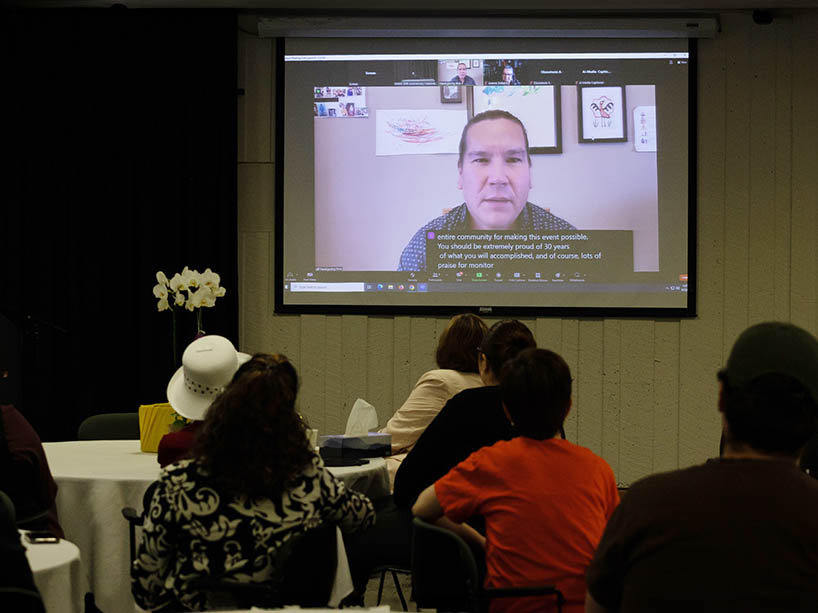
Anishinaabe writer, journalist, and TMU alumnus Waubgeshig Rice delivered his keynote speech virtually, in which he reflected on the importance of having GMISS as a student. “Having the confidence to undertake these storytelling careers and to really draw inspiration from my Anishinaabe identity and my community was enshrined in the four years that I spent at Toronto Metropolitan University, thanks to the wonderful work that Monica and her team undertook to ensure that community is essential to the entire learning process in that institution.”
A reflection of reconciliation and decolonization at TMU
GMISS has been foundational, monumental, and, as it grew, reflective of TMU's deep commitment to reconciliation and decolonization efforts. Key events and initiatives which owe their existence in part or totally to GMISS include the founding of the Standing Strong (Mash Koh Wee Kah Pooh Win) Task Force, the renaming of the university and Indigenization of the campus with art and murals by Indigenous community members, to name just a few.
Current and upcoming initiatives include TMU's School of Medicine leadership team recently welcoming Jamaica Cass as Indigenous health lead, special advisor to the dean, Indigenous Resurgence. Additionally, if approved, a new psychology course, currently in review by TMU's Senate, will be the first psychology course at TMU that is intentionally Indigenous.
With such a robust array of Indigenous-focused services, programming and supports, the number of Indigenous students who have enrolled at TMU since 2018 is close to 400. The number of Indigenous students graduating and the hiring and retention of Indigenous faculty and staff is at an all-time high.
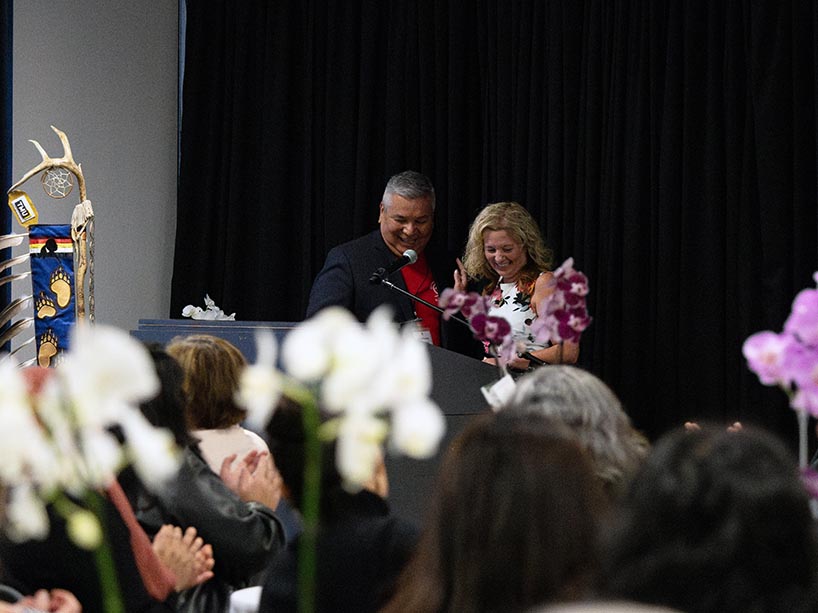
Brian Norton, program manager, GMISS, and Roberta Iannacito-Provenzano, provost and vice-president, academic, take to the podium. Iannacito-Provenzano reminded attendees, “As we reflect on the impact of GMISS over the past 30 years, let's remember that this is more than just a celebration of the past. It's a reaffirmation of our shared commitment to a future where Indigenous students continue to feel seen, supported and empowered.”
Looking to the future
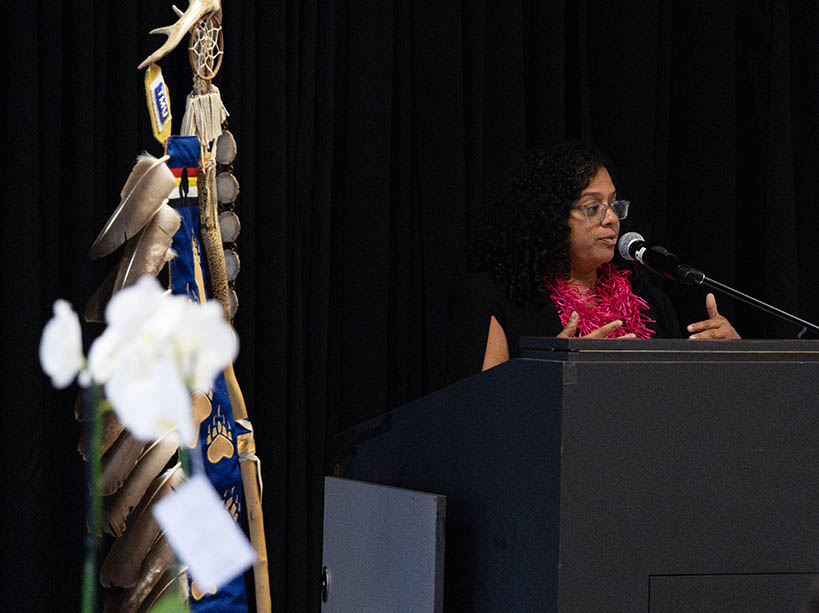
Tanya (Toni) De Mello, vice-president, OVPECI, acknowledged McKay’s tremendous commitment: “A big part of this story is how much resistance, institutional and individual, Monica has faced. This journey has often come at a great personal cost, with Indigenous Peoples pushing forward despite being told this wasn’t a priority, sharing their stories, carrying burdens that should never have been theirs, and teaching us lessons we should have learned ourselves.”
De Mello shared that it wasn’t until 2008, after 15 years of hard work, that things began to shift when former president Sheldon Levy and Alan Shepard, provost, placed a stronger focus and investment in Indigenous initiatives, spaces, education, programs, and services at TMU. “So while leadership was crucial, it’s important to recognize that the groundwork had been laid long before by those who were doing the work without support. The change we see today couldn’t have happened without both the relentless efforts of individuals like Monica and the leadership that finally backed them.”
There is more work to be done
Despite GMISS’s successes, no speaker was silent on the fact that there is yet more work to be done.
Joanne Dallaire, Elder and senior advisor, Indigenous Relations and Reconciliation, discussed how McKay, in her advocacy for the Indigenous community, is a force to be reckoned with. “Monica's very easygoing, but don't be mistaken by that,” Dallaire laughed. “Don't put her in a corner because that killer whale is certainly there. I'm proud of her for that—because our voices as Indigenous people have been silenced and forgotten.”
De Mello also referred to McKay’s clan and reminded those present that while fierce on its own, the killer whale’s true strength comes from travelling in a pod.
This could not ring more true for GMISS: an initiative that began with one student and, in the 30 years since, has flourished into a thriving community with far-reaching impacts. However, the continuance of this work relies not just on those who regularly step through its doors but also on the broader TMU community and fostering reciprocal relationships to ensure success.
With a hopeful glance to the future, McKay told attendees: “Success comes when we do that work together.”
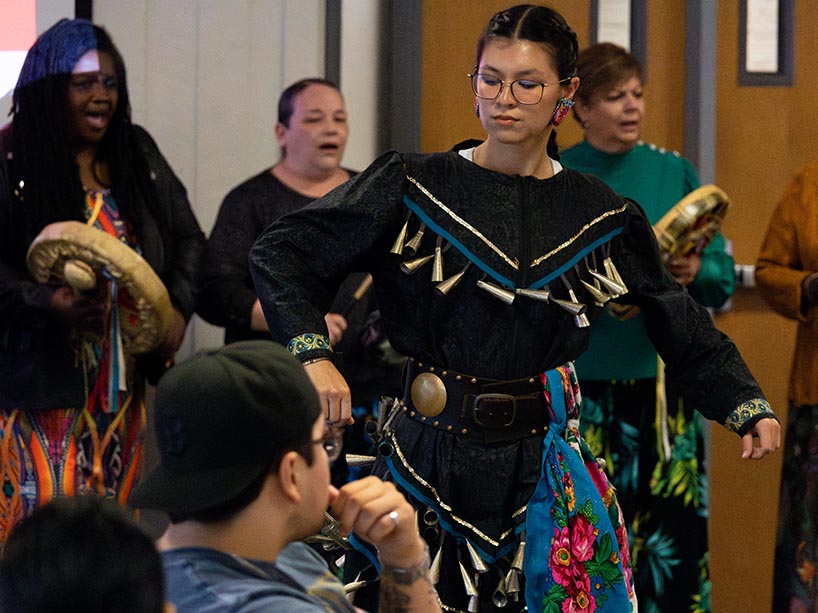
Madison Noon (Thunderchild Cree First Nation) and sisters Alecea Yerxa and Emma Yerxa (Couchiching First Nation) performed dances honouring the celebration. Noon recently graduated from TMU’s dance program; Alecea is a fourth-year biomedical science student, and Emma is a third-year criminology student. The Yerxas performed traditional dances in their jingle dresses, whereas Noon created a contemporary dance for the occasion. Photograph: Alecea Yerxa.
Gdoo-maawnjidimi Mompii Indigenous Student Services welcomes you
Gdoo-maawnjidimi Mompii, meaning "We Gather Here," embodies the significance of Indigenous students claiming their rightful space and presence on the TMU campus. It reflects both our enduring presence—past, present and future—and the community we are building. This name represents the ways we come together to celebrate the many paths we take in our educational journeys.
The university strives to foster positive relationships with the Indigenous community through the work of the Indigenous Education Council (IEC), Indigenous Student Services, and Indigenous Initiatives within the Office of the Vice-President, Equity and Community Inclusion (OVPECI).
Find out about programs and services offered by Gdoo-maawnjidimi Mompii Indigenous Student Services. Meet the rest of the GMISS team.
